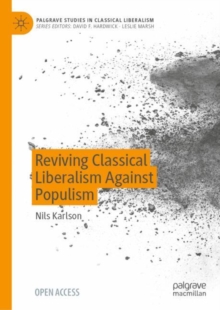
Retrieving Liberalism from Rationalist Constructivism, Volume I : History and Its Betrayal Hardback
by Walter B. Weimer
Part of the Palgrave Studies in Classical Liberalism series
Hardback
Description
This first volume, History and its Betrayal, traces the development of major themes of liberalism from the increase in human population beyond the limits of the face-to-face society of tribalism and small groups up until the present day.
It shows that the principles underlying liberalism are the evolutionary development of social organizations that have resulted from the complexity of human action rather than any conscious design or purpose. This book draws out the differences between the classical liberalism dependent upon spontaneous and tacit ordering as a result of evolution, and the explicit or conscious or directed version of progressivism.
It shows that the most important recent developments in the philosophy of rationality and the methodology of scientific research, as well as in evolutionary epistemology and the philosophy of biology, actually stem from the theories of complex social organization of the moralists such as Hume, Ferguson, and Smith.
The book shows clearly that classical liberalism was never refuted—indeed, no attempt to do so has been offered—it has simply been ignored in favour of programs which sound beneficial and soothing but which cannot be instituted without returning to tribalism.
Information
-
Available to Order - This title is available to order, with delivery expected within 2 weeks
- Format:Hardback
- Pages:316 pages, 1 Illustrations, black and white; XXI, 316 p. 1 illus.
- Publisher:Springer Nature Switzerland AG
- Publication Date:08/05/2022
- Category:
- ISBN:9783030948573
Information
-
Available to Order - This title is available to order, with delivery expected within 2 weeks
- Format:Hardback
- Pages:316 pages, 1 Illustrations, black and white; XXI, 316 p. 1 illus.
- Publisher:Springer Nature Switzerland AG
- Publication Date:08/05/2022
- Category:
- ISBN:9783030948573










